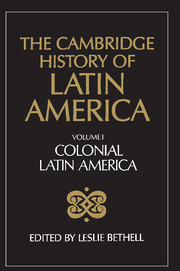Book contents
- Frontmatter
- PART ONE AMERICA ON THE EVE OF THE CONQUEST
- PART TWO EUROPE AND AMERICA
- 6 The Spanish Conquest and settlement of America
- 7 The Indian and the Spanish Conquest
- 8 The Portuguese settlement of Brazil, 1500–80
- 9 Spain and America in the sixteenth and seventeenth centuries
- 10 Spain and America: the Atlantic trade, 1492–1720
- 11 Bourbon Spain and its American empire
- 12 Portugal and Brazil: political and economic structures of empire, 1580–1750
- 13 Portugal and Brazil: imperial re-organization, 1750–1808
- PART THREE THE CHURCH IN AMERICA
- Bibliographical essays
- Indians of the Caribbean and Circum-Caribbean at the end of the fifteenth century
- The discovery and exploration of the New World
- References
13 - Portugal and Brazil: imperial re-organization, 1750–1808
from PART TWO - EUROPE AND AMERICA
Published online by Cambridge University Press: 28 March 2008
- Frontmatter
- PART ONE AMERICA ON THE EVE OF THE CONQUEST
- PART TWO EUROPE AND AMERICA
- 6 The Spanish Conquest and settlement of America
- 7 The Indian and the Spanish Conquest
- 8 The Portuguese settlement of Brazil, 1500–80
- 9 Spain and America in the sixteenth and seventeenth centuries
- 10 Spain and America: the Atlantic trade, 1492–1720
- 11 Bourbon Spain and its American empire
- 12 Portugal and Brazil: political and economic structures of empire, 1580–1750
- 13 Portugal and Brazil: imperial re-organization, 1750–1808
- PART THREE THE CHURCH IN AMERICA
- Bibliographical essays
- Indians of the Caribbean and Circum-Caribbean at the end of the fifteenth century
- The discovery and exploration of the New World
- References
Summary
Around 1738 the Portuguese ambassador to Paris, Dom Luís da Cunha, wrote that ‘in order to preserve Portugal, the king needs the wealth of Brazil more than that of Portugal itself’. Despite the abundance and diversity of its natural resources and manufactures, its large population and its military and naval strength, Portugal could not have survived if it had been reduced to its European territory alone. For two and a half centuries the Portuguese crown and a large part of the population had derived their main income from the commercial exploitation of the resources of their overseas territories. By the middle of the eighteenth century Brazil was by far the most important. A brief survey of the Portuguese empire will show how accurate Luís da Cunha's statement remained at the accession of Dom Jose I in 1750, and will help to explain the policy adopted with regard to Brazil during the second half of the eighteenth century.
To the east of the Cape of Good Hope, the Estado da India, which comprised all the Portuguese possessions from the east coast of Africa to Macao and Timor and which was controlled from Goa on the west coast of India, had been suffering from local rebellions and wars as well as the incursions of other European colonial powers. The Portuguese had long since lost their trading and shipping monopoly in the East and the Portuguese presence there was restricted to a few ports and trading posts. The Estado da India was thus weakened territorially – and also economically.
- Type
- Chapter
- Information
- The Cambridge History of Latin America , pp. 469 - 508Publisher: Cambridge University PressPrint publication year: 1984
References
- 2
- Cited by

